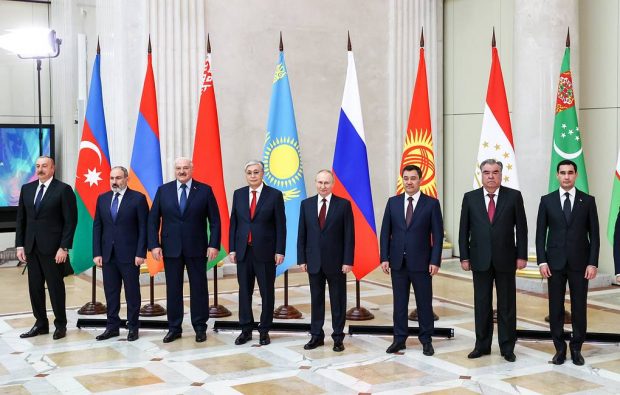CIS leaders hold summit in St. Petersburg; Kyrgyzstan to chair in 2023

CIS leaders holding their summit in St. Petersburg (Photo: TASS)
St. PETERSBURG: The leaders of the Commonwealth of Independent States (CIS) are meeting in for an informal two-day summit in St. Petersburg.
The summit, at the initiative of Russian President Vladimir Putin, is attended by Presidents of Azerbaijan Ilham Aliyev, Belarus Alexander Lukashenko, Kazakhstan Kassym-Jomart Tokayev, Kyrgyzstan President Sadyr Zhaparov, Tajikistan Emomali Rahmon, Turkmenistan Serdar Berdimuhamedov, and Uzbekistan Shavkat Mirziyoyev and Armenian Prime Minister Nikol Pashinyan.
In his welcome remarks, President Putin expressed gratitude to the participants for accepting the invitation to the city of St. Petersburg for the traditional informal New Year’s Eve summit on December 26 and 27.
“I would like to express my confidence that the deepening cooperation within the CIS meets the fundamental interests of the peoples of our countries, helps to more effectively solve the problems of socio-economic development of the Commonwealth states and strengthen regional stability and security,” Putin was quoted as saying by Russia Today.
“The challenges, security threats and disagreements in the CIS space are growing, but the main thing is that the countries are ready to cooperate.”
Trade between Russia and the other members of the Commonwealth of Independent States (CIS) will amount to $100 billion by the end of 2022, he said
President Kassym-Jomart Tokayev highlighted specific measures taken to strengthen the Commonwealth’s capacity during his chairmanship in 2022, and wished great success to President Sadyr Zhaparov in 2023 as Kyrgyzstan chairs the CIS, Kabar News Agency reported.
Earlier, CIS Executive Secretary Sergey Lebedev said that the summit would generate additional momentum to enhance cooperation between the CIS countries, Russia and Belarus.
Headquartered in the Belarusian capital Minsk, the Commonwealth of Independent States, an Eurasian regional intergovernmental organization formed after the dissolution of the Soviet Union in 1991, has nine members: Armenia, Azerbaijan, Belarus, Kazakhstan, Kyrgyzstan, Moldova, Russia, Tajikistan and Uzbekistan.
The countries together cover an area of 20 million square km in Eurasia, with an estimated population of 240 million.

























































